US Forces Targeted In Syria, No Casualties Reported
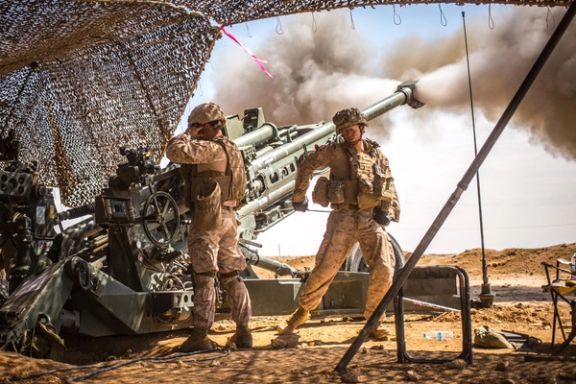
A US defense official told Iran International that a rocket attack targeted American troops at Mission Support Site Euphrates in Syria on Wednesday morning.

A US defense official told Iran International that a rocket attack targeted American troops at Mission Support Site Euphrates in Syria on Wednesday morning.
The official added that the attack left "no injuries or damages to infrastructure," noting that "This brings the total number of attacks (since mid-October) to 74 (36 in Iraq and 38 in Syria).”
Attacks on US troops in the region have intensified since Israel began its retaliatory offensive on Gaza in response to the Hamas attack of 7 October, which killed 1,200. Iran-backed militant groups in Iraq and Syria have claimed responsibility for the attacks, but Tehran denies any role, claiming that they are acting independently. However, the Islamic Republic calls these militant groups part of its axis of resistance against the United States and Israel. Almost every armed group that has targeted US forces in recent weeks is backed by or affiliated with the regime in Iran.
The American defense official added that he cannot speculate on future attacks, emphasizing that “Our forces in Iraq and Syria will stay focused on the mission we have at hand, which is preventing Daesh resurgence and advising, assisting and enabling our partner forces.”
The United States has 2,500 troops in Iraq, and 900 more in neighboring Syria, on a mission to advise and assist local forces in combating Islamic State, which in 2014 seized swathes of territory in both countries.
The official reiterated that US and Coalition forces “reserve the inherent right to self-defense.”
While Iran-backed groups have regularly attacked American bases in Iraq and Syria, injuring dozens, the Houthis in Yemen have seized a container ship and frequently launched missiles, including a ballistic missile last weekend that aimed at a US warship in the Gulf of Aden. The US has issued a warning to commercial shipping in the Indian Ocean.

Israeli government officials were today renewing their efforts to intensify the pressure on the EU and Germany to sanction Iran’s Islamic Revolutionary Guard Corps (IRGC) as a terrorist entity.
When asked if the EU and Germany should outlaw the IRGC, Lior Haiat, a spokesman for Israel’s foreign ministry told Iran International “We do. Because it is a terror organization.”
Israel’s special envoy for combating antisemitism, Michal Cotler-Wunsh, told Iran International, that the “IRGC and Hezbollah are terror groups and must be designated as such”.
Norbert Röttgen, a German MP from the Christian Democratic Union, told Iran International that "The German government has now repeatedly stated that the legal prerequisites for putting the IRGC on the EU terror list do not exist. This is simply not true. There are numerous cases, from within the EU as well as Canada and the US, which could be used as a basis for the process. I believe that the German government and the EU do not want to put the IRGC on the terror list, because they still hope for a revival of the JCPOA. But this is wishful thinking.“
The JCPOA is an acronym for the Joint Comprehensive Plan of Action, the formal name for the Iran nuclear deal.

Röttgen, who has spearheaded the efforts in Germany and on the continent to classify the IRGC as a terrorist organization, added “The regime has made it abundantly clear that they have no interest in a new deal. They are playing for time to finish building the nuclear bomb and they are already dangerously close. Germany and the EU urgently need a new Iran policy which focuses on supporting the people in Iran which want to get rid of the regime. This entails doing everything within our means to make life as difficult as possible for the Islamic Republic, including putting the IRGC as the political, economic and military center of power of the regime on the EU terror list."
Iran International sent press queries to Germany’s foreign minister, Annalena Baerbock, from the Green party, who has consistently refused to designate the IRGC a terrorist organization.
The United States during the Trump administration designated the IRGC as a foreign terrorist organization in 2019. US lawmakers previously called on American allies to outlaw the IRGC as a terrorist entity.
Iran International reported that Iranians pressed the EU in January to list the IRGC as a terrorist organization.
The European Union Parliament passed a non-binding resolution in early 2023 to sanction the IRGC as a terrorist movement.
Josep Borrell, Europe’s foreign policy chief, according to reports, does not wish to sanction the IRGC because it could impact the Islamic Republic’s willingness to negotiate an atomic deal that would impose temporary restrictions on its illegal nuclear program. Borrell also argues there needs to be a European judicial ruling against the IRGC’s terrorism activities to secure a ban of the Revolutionary Guard Corps.
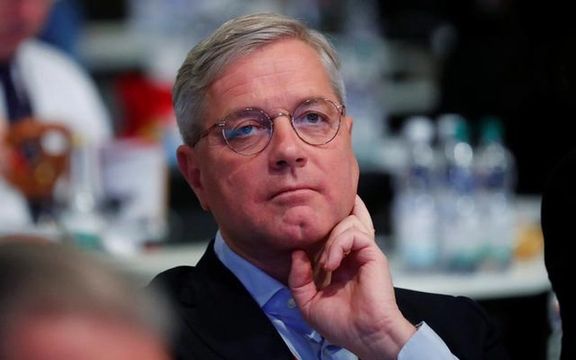
However, Röttgen and counter-terrorism experts have provided rulings. A telling example was the A German court convicted a Pakistani man in 2017 who was paid by the IRGC to engage in an assassination attempt of pro-Israel advocates.
The Quds Force—a part of the IRGC—paid Pakistani Syed Mustaf at least 2,052 euros from July 2015 to 2016 to spy on Jewish and Israel institutions and carry out the assassination plot.
Borrell’s office did not immediately answer Iran International press queries.
The Islamic Republic’s organized plan to aid Hamas in its massacre of 1,200 people, including at least 31 Americans, was front-and-center in the thinking of Supreme Leader Ali Khamenei, according to a report published by the Middle East Media Research Institute (MEMRI). Khamenei hinted on two different occasions, in 2022 and 2023, at "The Complete Conquest" of Israel in his media mouthpiece Kayhan.
According to a MEMRI translation from Khamenei’s propaganda outlet, Kayhan, the plan of mass murder was engineered by the late Iranian global terrorist Qassem Soleimani in 2020. The U.S. military assassinated Soleimani in early January 2020 for his overseeing the killing of over 600 American military personnel.
Kayhan wrote, according to the translation, that in August 2023 "The significance is that, last year, the Leader [Khamenei] gave 'the promise of the imminent conquest,' and this year he gave 'the announcement of the complete conquest,' and Operation Al-Aqsa Flood is part of this imminent conquest. This promise and announcement, along with the clarity and power of [Khamenei's] statements and positions in his meeting [with leaders and ambassadors of Islamic countries] on the occasion of the Prophet [Muhammad's] birthday, have profound significance and content."
The European Union has only classified Hezbollah's so-called “military wing” a terrorist entity but permits its “political wing” to raise funds and recruit new members. Hezbollah considers its movement to be a monolithic organization without wings.
The EU commissioner tasked with fighting anti-semitism, Katherina von Schnurbein, and her German counterpart, Felix Klein, have repeatedly refused to urge the EU and Germany to outlaw the lethal antisemitic organization IRGC. Both von Schnurbein and Klein faced criticism this year from Israeli General Amir Avivi because they praised an allegedly deficient German national report to combat antisemitism as a “milestone.” Avivi objected to the report because Klein and Germany’s interior ministry failed to include antisemitism from Hamas and Iran’s regime in the report as major threats to German Jews and the state of Israel.
Klein and von Schnurbein declined to respond if they agreed with their Israeli counterpart, Cotler-Wunsh, about the immediate need to designate Hezbollah and the IRGC as terrorist entities.
After considerable pressure from then-US ambassador to Germany, Richard Grenell, the German interior ministry outlawed all Hezbollah activities within its territory in 2020. Germany, however, has failed to enforce the ban, argue critics. According to German intelligence reports from 2023, there are 1,250 active Hezbollah operatives in Germany.
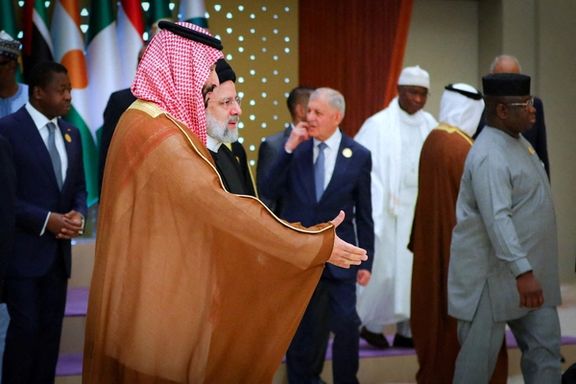
In a bid to prevent the Israel-Hamas conflict from spiraling into a regional war, Saudi Arabia has reportedly reached out to Iran with a proposal for investments in its economy.
The offer comes with the condition that Iran reins in its regional proxies, preventing them from escalating the ongoing conflict.
Arab and Western officials familiar with the matter revealed that Saudi Arabia has conveyed the proposal directly and through various channels following Hamas's invasion of Israel on October 7 and the subsequent conflict in Gaza.
The potential for increased collaboration was also discussed during a recent summit in Riyadh, where Iranian President Ebrahim Raisi and Saudi Crown Prince Mohammed Bin Salman addressed the war.
Simultaneously, Saudi Arabia is working with its allies, including the United States, to prevent Iran from leveraging the conflict to strengthen its "axis of resistance," encompassing armed groups in Lebanon, Palestinian territories, Iraq, Syria, and Yemen.
US Assistant Secretary of State Barbara Leaf confirmed Washington's collaboration with Saudi Arabia and its Arab allies in addressing Tehran's involvement.
As of now, neither the Saudi Foreign Ministry nor the Saudi Embassy in Washington has issued an immediate response to requests for comment on the matter. The region remains on edge, with concerns that a broader war could ensue if Israel resumes its military campaign against Hamas after the current truce concludes.
The Israel-Hamas conflict has become the bloodiest conflict since Hamas took control of Gaza in 2007.
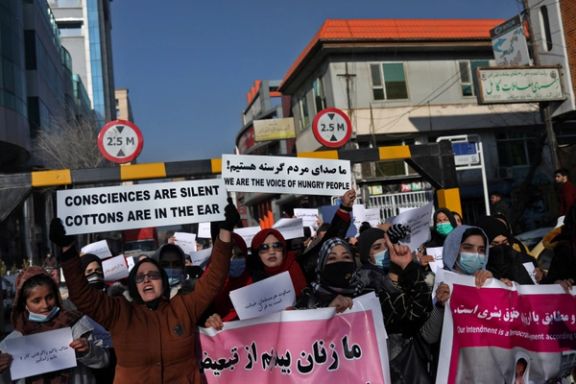
The German education minister says education is essential for the foundations of women's rights in Iran and Afghanistan, calling for international support.
Speaking to Iran International about ways to empower women in Iran and other authoritarian states, Bettina Stark-Watzinger, the Federal Minister of Education and Research and the Deputy Leader of the Free Democratic Party, praised the efforts by Afghan and Iranian women, pointing out that the fight for freedom is fostered by education, which is “the best way to make people independent.”
Speaking on the sidelines of an event organized by the Axel Springer Freedom Foundation, an NGO that supports human rights activists through financial support, Stark-Watzinger told Iran International’s Ali Samadi that the first steps for supporting Iranian women would be supporting dissident figures and make the world see “how human rights and women’s rights are violated.”
“We always have to speak up against” such violations, she added, alongside Iranian opposition figure Masih Alinejad and several other activists and officials.
Addressing Stark-Watzinger, Alinejad voiced appreciation for the German government, which she said has promised to back Iranian and Afghan women in their fight for freedom.
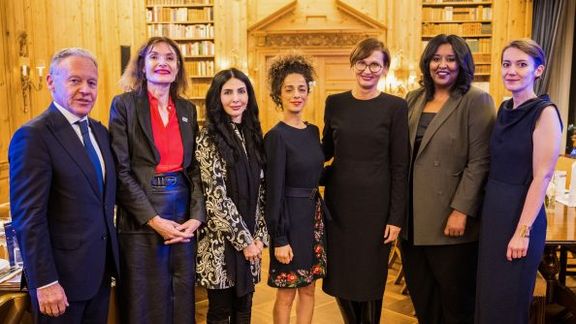
On the anniversary of the death of Mahsa Amini, whose death in morality police custody triggered a nationwide uprising, German Foreign Minister Annalena Baerbock pledged Berlin's solidarity with the people of Iran.
"Even if the protests have disappeared from the headlines, we will not leave the people of Iran on their own," she said. "We will place the fate of the people in Iran on the agenda in Brussels, New York and Geneva."
"As much as it breaks our hearts, we will be unable to change conditions in Iran from outside, but we will not hold back from giving the people in Iran a voice," Baerbock said at the time. Germany has also backed ongoing EU sanctions on Iran relating not only to its nuclear program but for its brutal suppression of protesters during the Women, Life, Freedom uprising. Baerbock has repeatedly condemned Iranian authorities for human rights violations and is among the most vocal European leaders who speak out against Tehran’s treatment of women and protesters.
Alinejad recognised the support, and said, “We believe that Iranian and Afghan women are fighting against a common enemy: gender apartheid".
During the event, the Axel Springer Freedom Foundation gave its courage award to Afghan women for their fight against the rule of Taliban, which has been intensifying restrictions on women’s education and social presence since it seized power in August 2021 as US-led forces withdrew after 20 years of war.
Referring to the award, Alinejad said that giving awards alone is not enough. “If you do not take practical steps to remove the Islamic Republic and the Taliban, they will eliminate you on German soil,” referring to assassination attempts she has so far evaded from regime security forces on foreign soil.
A UN assessment of the women’s rights situation submitted to the 15-member Security Council in November read, "The basic rights of women and girls, including the right to education and to work, and representation in public and political life – are not only fundamental obligations of a state, but also critical to build state capacity for long-term development and economic growth and peace and security.
"Any formal re-integration of Afghanistan into global institutions and systems will require the participation and leadership of Afghan women.”
Since the Taliban returned to power, most girls have been barred from high school and women from universities. The Taliban have also stopped most Afghan female staff from working at aid agencies, closed beauty salons, barred women from parks and curtailed travel for women in the absence of a male guardian.
In Iran, since last September's uprising, women have been under increasing oppression as they rebel against mandatory hijab. They have been banned from public spaces, education and faced fines and jail terms for shunning the state laws which has seen a nation rise up.
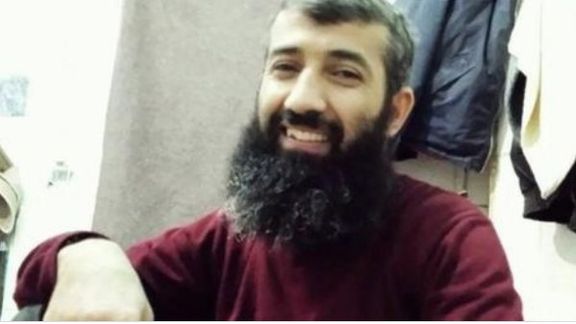
Ayub Karimi, a Sunni Kurd and a religious prisoner, was executed early on Wednesday in Karaj's Ghezel Hesar Prison.
Karimi, who had been sentenced to death approximately 14 years ago, was transferred to solitary confinement a week before the execution. Amnesty International had issued warnings in recent days, highlighting the imminent danger of Karimi's execution and urging authorities to cancel the sentence. Despite the pleas, Karimi, along with six other prisoners whose identities remain undisclosed, was hanged Wednesday morning.
Notably, Karimi was denied a final meeting with his family before his execution, mirroring the fate of his co-defendant, Qasem Abasteh, who was executed on November 5.
The human rights organization Hengaw has identified five more religious prisoners facing imminent execution: Davoud Abdollahi, Farhad Salimi, Anwar Khezri, Khosrow Besharat, and Kamran Sheykha. All of them were arrested in 2009 and held in the intelligence ministry’s detention center in Urmia.
In 2015, they were tried and sentenced to death, a verdict confirmed by the Supreme Court in 2020 after prolonged legal battles. Despite a plea for retrial in September 2020, the Supreme Court rejected their request.
The charges against the prisoners include "War against God," "corruption on earth," "support for Salafi groups," and an alleged "murder". However, the accused individuals consistently denied any involvement in the allegations in letters published by human rights organizations.
The situation for minority rights in Iran remains precarious. In July alone, the Kurdistan Human Rights Network reported that Iranian security forces detained at least 54 Kurdish activists and citizens in the western provinces of Iran.

The Governor of the Central Bank of Iran revealed plans to open an Iranian bank in Syria as the regime continues to prop up the crumbling Assad regime.
In a meeting with Syrian Prime Minister Hussein Arnous in Damascus on Wednesday, Mohammad-Reza Farzin made the announcement as both nations grapple with severe economic challenges.
Iran, facing a persistent financial downturn since 2018 due to US sanctions following its withdrawal from the JCPOA nuclear accord, has sought avenues to strengthen economic ties with Syria, which is in the throes of years of political and economic uncertainty and war.
Farzin also expressed Iran's intention to remove the dollar from economic and trade transactions between the two countries in the coming years.
Iran has been a significant financial supporter of Syria, spending tens of billions of dollars, a substantial portion of its constrained oil revenues, to sustain President Bashar al-Assad's regime. Estimates suggest that Iran has provided between $30 billion to over $50 billion in material aid to the government since 2011, a period during which Iran's annual oil revenues averaged between $20 billion to $40 billion.
Despite a decade-long effort to preserve the Syrian government, Iran holds a relatively small share of Syria's trade and has lost out to financially stronger players. The Revolutionary Guard, justifying its extensive involvement in the Syrian war, contends that trade and investment in Syria will eventually yield returns, compensating for the substantial financial and human costs Tehran has incurred to support the Assad regime, but so far it has not come true.